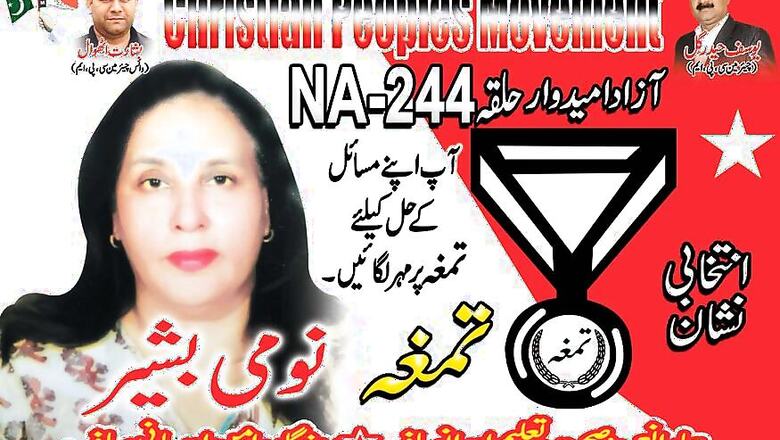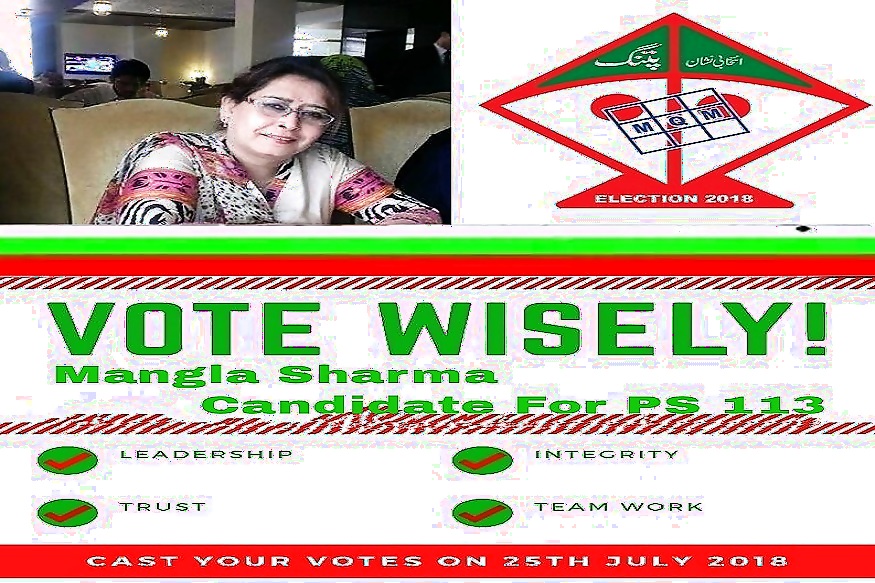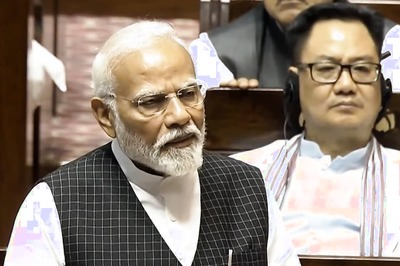Pakistan Elections: Women Minority Candidates Are Fighting Religion, Hierarchy For Electoral Success

views
New Delhi: Karachi’s NA-244 is a mix of high-rises and an equal number of crowded localities. Despite the existence of posh colonies, water and drainage problems remain at the heart of all issues here. This election, there are close to 29 people vouching for the seat from here with promises of solving the water problem in the area and standing alone amidst all the candidates is Naiomi Basheer, the lone female fighting from the area. She’s contesting for the first time - is an independent candidate and a Christian. And she’s fighting aware that she might not win.
“We want to come forward with a fight. I don’t care if I win or lose but I want to ensure that there is an election and not a selection," the 50-year-old tells News18.
Naiomi’s biggest challenge this election has been her struggle to let people see her without the filter of her religion.
“Muslims in the region are having a tough time accepting us. They keep asking us why I’m at their door. They tell me that that they would vote for “their own people"," she says.
“So, we told them that it’s general election which means that we are all equals. If a Christian can vote for a Hindu or a Sikh or a Muslim, then why can’t a Muslim vote for a Christian or for a Hindu or a Sikh. This election is not about religion. It’s about capability. People must vote for those candidates who they think will try and make efforts to make living easier for them and who would work for them," Naiomi adds.
Minorities make up for about 4% of Pakistan’s total population. Pakistan has an electoral system where minorities and women are allowed a specific percentage of reserved seats. There are, however, many like Naiomi who are fighting from a general seat.
Her argument stems from the holding of a general, same election for everybody. “Why do that if you don’t want to vote for a Christian?" she asks, adding that it was the responsibility of the communities to ensure that people were educated and aware of their candidates’ abilities and not be biased because of religion.
Further ahead in Karachi, Mangla Sharma has given it her all in her election campaign. Fighting from PS-113 along the coast, her area is mostly populated by fishermen. Unlike Naoimi, Mangla’s status as a minority has not been an issue for her.

“The best takeaway for me was that nobody came up to me saying that they won’t vote for me because I’m from a certain minority. I was a bit sceptical initially but my campaigning has reinstated my confidence. I have received a good response," she tells News18.
But she agrees that having the support of a party has helped her in erasing that bias. In 2001, during the local body elections, Mangla contested for the first time and was elected as councillor. Four years ago, she joined the MQM and is now fighting on their ticket.
“Independently, we as minorities don’t stand a great chance in winning an election. There are people who feel more affiliated to their own religion and community. So, it’s a good thing that I have the support of the party. And they have nominated me from an area where the percentage of minorities is not a lot," she says. In 2013, she lost the elections.
“While a lot of parties have given tickets to women, keeping in tandem with the mandatory 5% reservation, but to give a minority woman like me a chance to fight from Karachi is a big thing for me," she says.
For Naiomi, it is the demographic advantage card that she holds close to her heart. Reasserting that there is nobody who could understand the residents’ problems (since she herself is one), she said that people needed to understand who worked for them and who didn’t. Every time the elections happen, she added, politicians make promises and then vanish for years. “We don’t know what happens to those promises. Be it any political party. Pakistanis must give new players a chance. And if they don’t deliver then vote them out the next time," she said.
Naiomi, unlike the strong perception in Pakistan that the Army is meddling in the elections, thinks that it is actually the reverse. She backs the Army, calling them the ones having contributed the most to ensure that the elections are done in the best possible manner.
That, however, has not kept her away from threats. “It’s a bold step for me and it’s very difficult. There are so many extremist parties, names of which I can’t mention, but I have been pressurised not to fight elections. I told them that I was going to fight for the rights of my community and for everyone," she tells News18. Her opinion is voiced by Mangla who says while a minority candidate may face biases, it is the independent candidate that has more trouble.
“I have the advantage of fighting from a party. My party has an already established network. But for independents, it becomes an expensive affair and plus to reach out to people one-on-one is a task too, without any backing. With the party, there is a mechanism which makes it easier," Mangla adds.
“We have been told that we should not fight for elections because “votes are being diverted". Don’t we have any right? We are treated like the step children. But we are Pakistanis and we should be treated just as any other Pakistani is treated. I am a proud Pakistani and the Bible says that we keep our loyalties to the country we belong to and that will always be with Pakistan," Naiomi asserts.

















Comments
0 comment